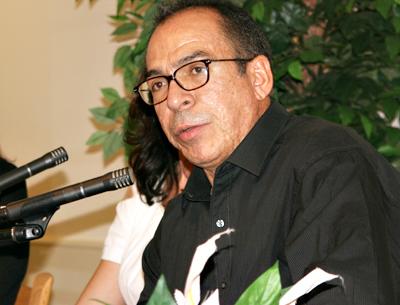‘Build Bridges, Not Walls’

Alfredo Corchado, the prizewinning Dallas Morning News journalist, whose beat is the dangerous border between the United States and Mexico, returned to the Rogers Memorial Library in Southampton recently to suggest, along with Shannon K. O’Neil, a senior fellow for Latin America studies at the Council on Foreign Relations, that Mexico and the United States each stand to gain appreciably if the relations between the two “distant neighbors” are strengthened.
Both the Mexican-born Mr. Corchado, a Nieman Fellow and a Woodrow Wilson Scholar, and Dr. O’Neil, who holds degrees from Yale and Harvard and who has taught at Columbia and testified before Congress on U.S. policy toward Mexico, have written books lately — “Midnight in Mexico,” in his case, and “Two Nations Indivisible,” in hers.
Having received four death threats arising from his courageous reporting — one ironically stemming from his revelation of a cartel-government peace pact that angered those on both sides used to huge drug-route kickbacks — Mr. Corchado, who was born in Durango, remains devoted to Mexico, a love that presumably informs his bravery, though at one point in “Midnight” he says at times he wouldn’t mind living a quiet family life in the country with a pet dog.
At another point in the gripping account of his struggle with Mexico’s corrupt politicians, the drug cartels, and the Gulf cartel’s heinous hit men, the Zetas, a struggle that continues to this day, his girlfriend tells him that the border is no place for big thoughts, such as he might have entertained during his Nieman Fellow year (2009) at Harvard.
Dr. O’Neil’s book, which is more policy-oriented, makes a good companion piece to Mr. Corchado’s. In fact, they probably should be read hand-in-hand by anyone interested in the subject, which most Americans, including those expats living out of the range of fire, would do well to further acquaint themselves with.
Dr. O’Neil, who, rather than a policed wall between the two countries, recommends bridges, as existed during the guest-worker program spanning World War II and the Korean conflict (a program leading to American citizenship in which Mr. Corchado’s own family participated), asserted during the talk and in the subsequent question-and-answer period that the North American Free Trade Act had, all things considered, been a success, and urged further efforts aimed at increasing mutually beneficial trade.
“Nafta transformed Mexico and helped secure the economic underpinnings of today’s broadening middle class,” she writes, adding that “Mexico, not the Middle East, should be the test case for solidifying market-based democracy.”
“. . . In the end, Mexico’s path, of course, depends on Mexicans. No other nation can decide its future. But, through our actions or inactions, the United States can either support Mexico or throw further obstacles in its way. And whichever path Mexico takes will have far-reaching repercussions for the United States.”
Both Mr. Corchado and Dr. O’Neil agreed that absent any effective bilateral action in dealing with what sometimes seems the overwhelming drug problem that links both countries — reducing demand for drugs in this country as well as stemming the alarming southerly flow of assault weapons — Mexico might well become another Afghanistan.
Mexico’s growing middle class — though the incidence of extreme poverty continues to provide fertile ground for cartel recruitment — offers a realistic hope, the speakers said, that over time, with governmental reform, an end to criminal impunity, a reconstituted judicial system, which is weak today, and a reversal of misguided U.S. immigration policies, can, with the help of an aroused Mexican citizenry, turn that country around.
“Yes, it’s been a long night,” wrote Mr. Corchado on the flyleaf of a copy of his book, “but after midnight comes the dawn.”
